 Our favourite alt-ethnography label, Sublime Frequencies, has a new record out and – surprise! surprise! - its another absolute corker. This time round, its an all-too-brief survey of the vibrant roots of contemporary Algerian rai called 1970's Algerian Proto-Rai Underground.
Our favourite alt-ethnography label, Sublime Frequencies, has a new record out and – surprise! surprise! - its another absolute corker. This time round, its an all-too-brief survey of the vibrant roots of contemporary Algerian rai called 1970's Algerian Proto-Rai Underground.
If you had even a vague interest in world music during the early 90's, then you probably would have heard of rai music, a style of North African pop that was notable for the rough but hypnotic wailing of male vocalists like Cheb Khaled. But even if you missed that, then you might have heard Desert Rose, an insufferably bland piece of car-commercial music by Sting that became an international hit in 2000 and featured golden-throated young rai star, Cheb Mami, whose contribution was sufficiently over-produced to render it innocuously exotic.
For much of the history of rai, though, "innocuously exotic" is probably the last thing you would have accused it of being... The genre began life in the 1920's when rural Bedouin peasants, who had been robbed of their land by French settlers, moved to the port city of Oran to work in the factories there. They naturally brought their traditional songs with them and fused them with those of the local cabarets to produce the musical bastard that became known as rai.
From the start, its lyrics focussed heavily on the lives of its urban poor audience, and often broached subversive or taboo subjects like drinking, police harassment and forbidden love. Such subject matter ensured that rai would remain officially banned until the 1980's.
Its birth in cross-pollination also meant that rai musicians were always amenable to absorbing influences and instruments from elsewhere. This started with borrowings from the music of the French colonisers and was followed, in the latter half of the century, with the incorporation of elements from Western rock and pop.
1970's Algerian Proto-Rai Underground focusses on this last stage of rai's development prior to it becoming acceptable and going mainstream. It showcases eight tracks from the “bad boys” of the time, who were injecting a raucous, rockin' sound into the genre and using Western instruments like trumpets and electric guitars with wah pedals. The following track, by one of the godfathers of modern rai, Messaoud Bellemou, is typical of the sound of the time – boisterous trumpet (courtesy of Bellemou), clattering rhythms, droning organ, and vocalist, Sheikh Benfissa, wailing over the top of it about... owning a car. No slick production values here, just wildly infectious frisson and fun.
Bellemou & Benfissa - Li Maandouche l'Auto
The album which is only available as an LP at the moment, can be purchased from Forced Exposure (scroll down to the bottom of the page).
 Without doubt, the most exciting guitar music in the world today is emanating from Saharan Africa... You may, for instance, have heard of Tuareg refugee supergroup, Tinariwen; or, if you're a regular of this site, Group Doueh.
Without doubt, the most exciting guitar music in the world today is emanating from Saharan Africa... You may, for instance, have heard of Tuareg refugee supergroup, Tinariwen; or, if you're a regular of this site, Group Doueh.
Well now, you can add Group Inerane to that list. Although they're geographically close to Tinariwen (that group hails from Southern Libya and Inerane are from Niger), their sound is closer to Group Doueh's lazily looping rough-as-guts rifforama. Here's a track from their Sublime Frequencies release:
 “World music” is a notoriously lazy piece of nomenclature – a convenient catch-all that can be used to denote anything with exotic instrumentation or foreign-sounding vocals that might come from a place beyond our immediate musical neighbourhood. At the recent Australian Recording Industry Associations awards, its “laziness” reached new heights when Geoffrey Gurrumul Yunupingu, an indigenous singer who records in his native tongue, received the gong for best “world music” album...
“World music” is a notoriously lazy piece of nomenclature – a convenient catch-all that can be used to denote anything with exotic instrumentation or foreign-sounding vocals that might come from a place beyond our immediate musical neighbourhood. At the recent Australian Recording Industry Associations awards, its “laziness” reached new heights when Geoffrey Gurrumul Yunupingu, an indigenous singer who records in his native tongue, received the gong for best “world music” album...
(And BTW, if you haven't checked out his music, you really should. He is blessed with one of the most beautiful voices this country has ever produced.)
There are instances though when “world music” is probably the only term that really captures what a genre is all about. One of these instances is taraab...
Taraab, which comes from an Arabic word that means “joy with music”, first appeared in the East African sultanate of Zanzibar a century ago when the sultan of the day sent his court musicians to the Middle East to study that region's traditional musics. They returned with a solid grounding in the modes, scales and improvisational styles that were all the rage in Cairo and Istanbul, and quickly adapted them to local tastes. In time, this new Zanzibarian sound spread to Mombasa, Dar Es Salam and other important centres on the East African coast. In process, it was further hybridised and expanded to encompass musical influences from as far afield as India and Europe. (With the colonisation of the area by Germans towards the end of the 19th Century, even polkas entered the mix.)
Now, taraab has itself become a catch-all term for a diverse collection of East Tanzanian musics that are all sung in Swahili but which take their cues from a variety of “world music” styles.
In our own narrow little corner of the “world music” neighbourhood, the pre-eminent exponents of taraab are the New York ensemble, Sounds of Taraab. Here's one of their signature tracks:
Sounds of Taraab - Mahaba Wa Taka Nini
 In this age of globalised music markets, it's common to talk of certain Western cities as centres of "world music". When we do, it generally means that these cities are magnets for Third World musicians who come to record in top-notch studios and sign deals with big-time labels who will pitch their music to an educated and receptive Western audience. Once upon a time, though, being a nominal centre for "world music" meant something completely different...
In this age of globalised music markets, it's common to talk of certain Western cities as centres of "world music". When we do, it generally means that these cities are magnets for Third World musicians who come to record in top-notch studios and sign deals with big-time labels who will pitch their music to an educated and receptive Western audience. Once upon a time, though, being a nominal centre for "world music" meant something completely different...
In 1922, the London-based Zonophone label brought out its first release aimed at a West African audience - a platter of Christian hymns recorded in Yoruba by Fela Kuti's grandfather. The record must have been fairly successful as, by the late 1920's, Zonophone was making a serious push to corner the West African market.
Unlike later major label ventures into this market, however, they had no interest in actually taking recording equipment to Africa to record local artists. Instead, they remained resolutely rooted in their London studios and scoured the African ex-patriate community for musicians who could churn out product for the folks back home.
The result was hundreds of discs documenting every West African musical style of the day; none of which were intended for anyone outside of their ultimate audience in Africa. In the process of recording of them, Zonophone effectively turned London into one of the first centres of "world music". Because of the primary audience of their recordings, though, it was never recognised as such...
Now, however, thanks to Honest Jon Records, who have released an album of those Zonophone recordings, we finally have a glimpse into the African music export underground of that period. Here's a track from it by one of the stars of early Ghanaian high-life, George Williams Aingo. When translated, its lyrics go something like this: Old man Bonto, I've brought money home / Back from abroad / Living is hard ayee / Old man Bonto, I've brought money home
George Williams Aingo - Akuko Nu Bonto
 To the wider world, Saban Bajramovic is probably best known for his musical contributions to the films of Emir Kusturica (Underground, Black Cat White Cat), but in the world of the Roma, this Serbian artist has been immortalised as the man who first recorded Djelem, Djelem, the official Gypsy national anthem. In addition to this, he wrote and recorded close to 650 other songs. On Sunday, he passed away from a heart attack in his hometown of Nis in southern Serbia.
To the wider world, Saban Bajramovic is probably best known for his musical contributions to the films of Emir Kusturica (Underground, Black Cat White Cat), but in the world of the Roma, this Serbian artist has been immortalised as the man who first recorded Djelem, Djelem, the official Gypsy national anthem. In addition to this, he wrote and recorded close to 650 other songs. On Sunday, he passed away from a heart attack in his hometown of Nis in southern Serbia.
Saban Bajramovic - Djelem, Djelem
 The second most exciting piece of reissue news this week is that Group Doueh: Guitar Music From The Western Sahara has finally made it on to CD. Originally released on Sublime Frequencies last year as a strictly limited LP, it is one of the few releases on that label devoted to a single act. (As regular readers will know, their usual stock in trade is hallucinogenic radio collages.)
The second most exciting piece of reissue news this week is that Group Doueh: Guitar Music From The Western Sahara has finally made it on to CD. Originally released on Sublime Frequencies last year as a strictly limited LP, it is one of the few releases on that label devoted to a single act. (As regular readers will know, their usual stock in trade is hallucinogenic radio collages.)
And its easy to see why the nabobs at Sublime Frequencies devoted a whole album to this stuff. This is some truly weird and wild fare - like a raucous, lo-fi B-side to the more refined Saharan guitar acts like Tinariwen. The song forms are quintessentially local but the rough electrification and effects were inspired by tapes of Jimi Hendrix and James Brown that the band leader, Baamar Salmou aka Doueh, picked up in the early eighties.
Group Doueh - Eid For Dahkla
Group Doueh - Wazan Samat
The album can be purchased from Sublime Frequencies.
(FOOTNOTE: Most exciting reissue news of the week? Superfuzz Bigmuff, natch)
 Apart from anything else, Black Mirror: Reflections in Global Musics is a testament to the diversity of obscure global music that one can unearth in a modern multicultural city if one takes the time and effort to look. The album, compiled by record store proprietor Ian Nagoski, is an astonishing treasure trove of early twentieth century “world music” sourced from dusty old 78s that he picked up in thrift stores, flea markets and private collection sales; all no more than 30 minutes drive from his home in Baltimore. (In addition, the total sum paid for the 32 recordings on the album amounted to no more than $125.) The tracks come from countries as diverse as Ireland, Poland, Syria, Cameroon, India and Laos, and include some genuinely historical artefacts such as the first commercial recording of Balinese gamelan. Here, for your listening pleasure, are just two. The first is a lively African interpretation of Cuban rhumba by a mid 50's ensemble from Cameroon; and the second is a 1919 recording of the unearthly wailing vocals of Greek rebetika singer Marika Papagika.
Apart from anything else, Black Mirror: Reflections in Global Musics is a testament to the diversity of obscure global music that one can unearth in a modern multicultural city if one takes the time and effort to look. The album, compiled by record store proprietor Ian Nagoski, is an astonishing treasure trove of early twentieth century “world music” sourced from dusty old 78s that he picked up in thrift stores, flea markets and private collection sales; all no more than 30 minutes drive from his home in Baltimore. (In addition, the total sum paid for the 32 recordings on the album amounted to no more than $125.) The tracks come from countries as diverse as Ireland, Poland, Syria, Cameroon, India and Laos, and include some genuinely historical artefacts such as the first commercial recording of Balinese gamelan. Here, for your listening pleasure, are just two. The first is a lively African interpretation of Cuban rhumba by a mid 50's ensemble from Cameroon; and the second is a 1919 recording of the unearthly wailing vocals of Greek rebetika singer Marika Papagika.
Ngo Mebou Melane - Paul Pendja Ensemble
Smyrneiko Minore - Marika Papagika
The album is released on the Dust To Digital label and can be purchased from their website.
 Looking for tasty hip-hop instrumental remixes of retro Vietnamese pop? How about if such aforementioned remixes were part of an attempt by the producer to connect with his cultural heritage? And proceeds from album sales were going to a good cause?
Looking for tasty hip-hop instrumental remixes of retro Vietnamese pop? How about if such aforementioned remixes were part of an attempt by the producer to connect with his cultural heritage? And proceeds from album sales were going to a good cause?
Well, that’s what you get with Chinoiseries, an album by French DJ Onra which came out of a visit to the land of his grandparents, Vietnam. While he was there, a local taxi driver helped him acquire 30 platters of 50’s & 60’s Viet-pop, and an orphanage worker named M. Hoa inspired him to produce something that might raise money for local street kids.
The 32 tracks on this album are all short, loop based affairs that revel in the melodies and crackly textures of their battered vinyl source materials. Here are two sample tracks:
The Anthem - Onra
I Wanna Go Back - Onra
The album can be purchased from Piccadilly Records and proceeds go to La Goutte d’Eau.
 The mbira is the Zimbabwean version of that most African of instruments, the thumb piano. Consisting of a box or gourd on which tuned tongues of metal are mounted, the mbira is played by plucking the tongues which produce a hollow metallic chime. In its country of origin, it is the centerpiece of a style of ritual trance music that uses repetitively plucked phrases to call forth ancestral spirits. An example of this type of playing can be heard in the clip below by “scandalous” mbira virtuoso, Stella Chiweshe. (Chiweshe is scandalous because she is a woman and mbira music in Zimbabwe is traditionally regarded as the exclusive province of men.)
The mbira is the Zimbabwean version of that most African of instruments, the thumb piano. Consisting of a box or gourd on which tuned tongues of metal are mounted, the mbira is played by plucking the tongues which produce a hollow metallic chime. In its country of origin, it is the centerpiece of a style of ritual trance music that uses repetitively plucked phrases to call forth ancestral spirits. An example of this type of playing can be heard in the clip below by “scandalous” mbira virtuoso, Stella Chiweshe. (Chiweshe is scandalous because she is a woman and mbira music in Zimbabwe is traditionally regarded as the exclusive province of men.)
Here in the West, the mbira is mostly regarded as an exotic novelty; a piece of plunkable Africana that can be picked up for a couple of bucks at any weekend market frequented by dreadlocked hippies. Some serious musicians (and Trent Reznor) have dabbled with it but, to date, the only Occidental to seriously explore its potential is Richard Crandell.
A jazz guitarist who’s performed with the likes of Leo Kottke and John Fahey, Crandell learnt the mbira from a master – Ngoni Nakombe, who plays in the band of Zimbabwe’s biggest “star”, Thomas Mapfumo. In the process, he no doubt gained a familiarity with the traditional style and its emphasis on repetition, and this has found its way into his delicately hypnotic minimalist compositions, whose reference points stretch from Terry Riley and Phillip Glass to CPE Bach and Japanese music.
Richard Crandell - Etude In E
Richard Crandell - Japanese Lullaby
So far he’s produced two albums in this vein, Mbira Magic and his latest, Spring Steel (from which the two above tracks are taken). Both were released on Tzadik, and though they may not be as restlessly kinetic as more traditional fare, I’m sure the ancestors would still approve.
 In the past couple of the years, baile funk – the raucous amalgam of Miami bass, hip-hop, funk and samba breaks that emerged in the ghettos of Rio De Janeiro in the 90’s – has gone from occupying pride of place in the record collections of the hip cognoscenti to becoming one of the biggest block parties in global urban music. In this country, it has even found its way in to a TV underwear ad… briefly.
In the past couple of the years, baile funk – the raucous amalgam of Miami bass, hip-hop, funk and samba breaks that emerged in the ghettos of Rio De Janeiro in the 90’s – has gone from occupying pride of place in the record collections of the hip cognoscenti to becoming one of the biggest block parties in global urban music. In this country, it has even found its way in to a TV underwear ad… briefly.
(The ad was pulled when a translation of the backing track’s lyrics revealed a young woman lewdly declaring “meet me after school/ And I’ll beat you like a gorilla/ Bite you like a whore/ Come and play with my pussy”. All in all, much too racy to be legally broadcast on free to air TV.)
And as it has grown from ghetto obscurity to worldwide fame, this image of booty-shaking hypersexuality has become its global “face”. To quote long-time champion Diplo: "The only concern for these artists is, ‘What’s gonna make the girls dance, throw their clothes onto the stage and wanna have sex?’"
But there are other sides to the baile funk phenomenon as well; some positive, others less so… Among the latter is that exposed by Probidao CV, a CD of drug gang baile funk released in November last year by Sublime Frequencies.
In the Rio favelas (the local term for ghettos), the dominant economic organisations are the drug gangs – they process over a million dollars of cocaine a month – and so they inevitably exert their influence over any large scale community activity. And baile funk parties are no exception. As one cynical local commented in a 2005 Blender article on the scene: "The bailes ["balls" or parties] are profit-making exercises. They attract customers to the favela to buy their drugs."
In the days before bailes become popular and could serve as indirect marketing exercises, the drug gangs took a more direct approach; staging their own parties and enlisting MCs to perform tracks that glorified the gang and spewed invective on its rivals. Unlike the effervescently technicolour baile funk that we have become used to, this was far simpler and darker fare. Generally, they consisted of a single rhythm track from a Miami bass sample CD accompanied by vocal harangues barked into the mike at maximum volume. (Even if you knew nothing about the context in which they were made, you would have no difficulty guessing their link to violent illicit activity.)
As with all Sublime Frequencies albums, this one can be purchased from the label’s website.
 Mariem Hassan is the premier songstress of the Saharawi, a Berber Arab people made stateless by one of the longest wars in post-colonial African history. The homeland of the Saharawi is the country commonly known as Western Sahara, a largely arid chunk of land wedged between Morocco and Mauritania on Africa’s far western coast.
Mariem Hassan is the premier songstress of the Saharawi, a Berber Arab people made stateless by one of the longest wars in post-colonial African history. The homeland of the Saharawi is the country commonly known as Western Sahara, a largely arid chunk of land wedged between Morocco and Mauritania on Africa’s far western coast.
When its former colonial masters, Spain, were driven out of Western Sahara in 1975 by an indigenous guerilla movement known as the Polisario Front, both Morocco and Mauritania claimed the fledging nation as their own. After an initial carve up that divided it between the two, the Polisario (who had formed a government called the Saharawi Democratic Arab Republic) went to war against their new occupiers. After four years of fighting, they ousted the Mauritanians only to be ousted by the Moroccans who, till this day, remain the effective rulers of Western Sahara.
The SADR and its followers, meanwhile, have spent much of the past 25 years in refugee camps in the harsh desert of Western Algeria. In that time, their plight has become increasingly invisible to the outside world, and their only real exposure on the international stage has been via Meriam Hassan, who has had records released in the West and has become the de facto voice of the Saharawi.
And, as far as a “voice of a people” goes, hers is something special indeed – raw, guttural, explosive and filled with wailing passion… Just listen to the following two tracks from her 2002 album, Mariem Hassan con Leyoad.
Mariem Hassan - Id Chab
Mariem Hassan - Sahara Neb Gija
The full album can be purchased from Calabash, and more information about the Saharawi Arab Democratic Republic can be found here. For more info on Mariem herself, check out this fan-site.
(Many thanks to Benn Loxo Du Taccu for switching me on to this amazing singer)
 On November 25 last year, Mexican banda singer Valentin Elizalde, aka “The Golden Rooster”, was being driven away from a concert in the border town of Reynosa when two cars came up alongside his Chevrolet and riddled it with automatic gunfire; killing Elizalde, his manager, and his driver. The culprits were Los Zetas, a notorious hit squad in the employ of the Gulf drug cartel, and the reason for their hit was a video of an Elizalde song that had recently been posted on YouTube.
On November 25 last year, Mexican banda singer Valentin Elizalde, aka “The Golden Rooster”, was being driven away from a concert in the border town of Reynosa when two cars came up alongside his Chevrolet and riddled it with automatic gunfire; killing Elizalde, his manager, and his driver. The culprits were Los Zetas, a notorious hit squad in the employ of the Gulf drug cartel, and the reason for their hit was a video of an Elizalde song that had recently been posted on YouTube.
The song was a rousing brass band backed number entitled A Mis Enemigos (To My Enemies), and the video was a ghastly procession of images of drive-by shootings and gangland executions. It earned Elizalde a death warrant because of his known affliation with the Sinaloa drug cartel who were rivals of the Gulf cartel. The video was thus perceived as provocative taunt at the Gulf cartel’s expense and Elizalde suffered the consequences. (Elizalde’s killers then followed up his execution with a posting of the video of his autopsy on YouTube.)
As shocking as this episode seems, it is an unsurprising outcome of a long and increasingly entangled connection between one style of Northern Mexican music and the drug-smuggling underworld. That style is known as narcocorrido; literally “drug ballads”. It has its roots in the polka-based narrative ballads (or corrido) that were sung in Northern Mexico in the early 20th century to celebrate local outlaws who allied themselves with the revolutionary forces of the time. These outlaws, who had Robin Hood like reputations, would sustain themselves by raiding local mining concerns and smuggling luxury goods into Mexico from the US.
With the advent of Prohibition in the US, the direction of the smuggling trade reversed and the outlaws became tequiladeros, spiriting a regular supply of the Mexican national drink to thirsty gringos north of the border. When Prohibition ended, other illegal substances took the place of alcohol and the drug trade was borne. By this time, the songs about the practitioners had devolved from heroic ballads about “people’s bandits” to cautionary tales of small-time traffickers who met regrettable ends.
One particularly famous example of this is Carga Blanca (White Cargo) which tells of a group of smugglers who travel to San Antonio, Texas to sell their illicit “white cargo”. Once the deal is done, they are stopped by a car full of shady characters who are obviously working for the buyers and who ask them to hand over the money. Shots are fired, two of the smugglers are killed, the rest end up in jail, and the buyers ultimately get their money back. (Since this song was first recorded in the 1940’s, over 60 versions of it have been released. The one I’ve posted was laid down by Los Cuatesones in 1948 and appears on the Arhoolie Records album, The Roots of Narcocorrido.)
Although its modern form was well-established by the 1940’s, it was not until the 1970’s that narcocorrido finally came into it own with bands like Los Tigres Del Norte popularising it. As its popularity has grown, however, so too have the direct links between the corrodistas and their subject matter. Although many will not admit it, it has now reached the point where drug-smugglers pay songwriters to write ballads about their exploits. It is thus no surprise that it has all finally come to a head with the tragic case of Valentin Elizalde.
(Although it is cold comfort for Elizalde, his death has turned him into an Internet celebrity, and this has recently translated into record sales with two of his albums finally reaching the top of the Billboard Latin charts.)
For more on narcocorrido, the Mexican underworld, and the Internet, check out the following articles.
 For the last 25 years, the Basque Nationalist Party (EAJ-PNV) has been the dominant political force in the Basque regions of northern Spain. As part of their cultural policies, they have consistently promoted traditional music as an unquestioned cornerstone of Basque identity. The result has been a stultifying lack of self-criticism that has effectively sidelined those with more radical musical agendas. It’s a situation that Arto Artian is looking to change..
For the last 25 years, the Basque Nationalist Party (EAJ-PNV) has been the dominant political force in the Basque regions of northern Spain. As part of their cultural policies, they have consistently promoted traditional music as an unquestioned cornerstone of Basque identity. The result has been a stultifying lack of self-criticism that has effectively sidelined those with more radical musical agendas. It’s a situation that Arto Artian is looking to change..
Formed late last year, this net label, which was featured in a recent profile of the Basque avant-music scene in The Wire, mainly focuses on experimental artists; but there are occasional forays into styles like electro and industrial. To give you a taste of their output, here are three very different acts who are featured on it:
Oier Exteberria (mp3) – from Ondamedia (Basque for “catastrophe”), a soundtrack designed to accompany a series of postcards parodying iconic Basque images. The music itself is a Otomo Yoshohide style collage of traditional Basque tunes underscored with a recording of doctors performing an autopsy. In the course of it, they remark: “It seems dead but sometimes it seems to reanimate.”
Joseba Irazoki (mp3) – a guitarist who specialises in processed pastoral post-rock. This is from his album, Tokian tokiko.
Gutariko Bat (mp3) – the Basque Fugazi; this track is from a compilation of their recordings from the mid 90’s.
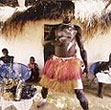 While we’re in Ghana, and on the subject of funeral music, here’s a far more unreconstructed traditional response to the passing of a loved one from the Ashante people of central Ghana.
While we’re in Ghana, and on the subject of funeral music, here’s a far more unreconstructed traditional response to the passing of a loved one from the Ashante people of central Ghana.
I originally bought this album, back in 1997, solely on the basis of its title, Drums of Death. (Who, after all, could resist a title like that?…) Coming from the West where funerals are designed to contain and solemnise grief, I naturally expected something sombre and ponderous. What I got instead was a torrent of pounding cathartic polyrhythms that completely floored me. This was not some muted observance of a burial; this was a raucous, full-blooded celebration of a journey to another realm. To paraphrase the liner notes, death in Ashante culture marks the passing of the deceased into the company of the ancestors who the living “rely upon for advice, comfort and guidance… And so with every death, there is a party, and the family, tribe and other celebrants drum, dance, sing and socialize.”
The CD, which was produced by John Zorn, is out of print, but you can still find copies on Amazon, and I urge you to snap one up. If you need any convincing, listen to this mp3 of the third track on the album, Adva Part 1.
 When we think about the ways in which technology reshapes traditional music, our ideas are generally influenced by how that process has unfolded in the West in the past century or so. And for us, its largely been about electricity – electrical instruments and amplification forging loud, stadium-filling rock from formerly intimate folk styles like blues and country; electronic synthesisers turning once-organic urban grooves into wholly synthetic dance music; and samplers, sequencers and multi-track recording turning everything into infinitely malleable sound sources. Thus, when “traditional music meets technology” these days, it invariably equates to an overlay of drum machines and synths, and a nice high-gloss digital recording.
When we think about the ways in which technology reshapes traditional music, our ideas are generally influenced by how that process has unfolded in the West in the past century or so. And for us, its largely been about electricity – electrical instruments and amplification forging loud, stadium-filling rock from formerly intimate folk styles like blues and country; electronic synthesisers turning once-organic urban grooves into wholly synthetic dance music; and samplers, sequencers and multi-track recording turning everything into infinitely malleable sound sources. Thus, when “traditional music meets technology” these days, it invariably equates to an overlay of drum machines and synths, and a nice high-gloss digital recording.
But electric/electronic instruments and gadgets aren’t the only forms of “modern Western” technology that can have a ground-shifting impact on a traditional style of music; sometimes it can be something far more humble. In the case of the Por Por music of Ghana, its some of the most low-tech devices you can imagine: the squeeze-bulb vehicle horn (ala the picture at the top of this post), the pneumatic tire wheel, and the tire pump.
Por Por (which is an onomatopoeic rendering of the sound produced by squeezing said horns) is a style of music invented by truck and taxi drivers of Ghana which takes traditional music played on animal horns and bells, and renders it on vehicle horns, tire pumps, and wheel rims. (The style apparently emerged as a result of frequent breakdowns by truckers on deserted back-country roads. Fearfully of attacks by wild animals, they would honk horns and bang wrenches on tire rims “like crazy” and the sound was born.)
Over time, these improvised bangs and honks matured into the fully-developed style, often accompanied by large choirs, but performances were to restricted funerals of drivers, so Por Por remained unknown to the outside world. Until now, that is…
A month or so ago, the music was finally exposed to the world via an album called Por Por: Honk Honk Music of Ghana which you can purchased as a CD or mp3/FLAC downloads from the Smithsonian Folkways site.
To give you a taste of it, here is the song, Otsokobila, performed by the La Drivers Por Por Group.
OK, time for some manic folktronic party stomp from Syria; courtesy of local superstar, Omar Souleyman. The song’s called Leh Jani, and it’s about finding out that your beloved is engaged to another man. Normally, you’d expect such subject matter to provoke some form of anguished lament; but for Souleyman, the occasion demands a thumping beat, phased-out synth noodling, and frenetic insectoid oud. All of which is fine by the fans, who form lines on the dancefloor and start discreetly pogoing in formation. Fun, fun stuff.
If you like that track (which you can download as an mp3 here), you might also enjoy Jani, an even more crazed number which was released in 1996 and became Souleyman’s first big hit. Both of these songs can also be found on Omar Souleyman: Highway To Hassake, a compilation of material culled from the 500+ cassettes (!) that he has recorded in his 10 year career. The CD is out on our favourite disorientalist label, Sublime Frequencies, and can be purchased here.
(The video itself was posted on YouTube by porest aka Mark Gergis, the man who put the compilation together. In addition to this, he’s posted a video of a performance by a Lebanese improv trio, featuring Mazen Kerbaj, the free jazz trumpeter who recorded that spontaneous duet with Israeli jets bombing Beirut. Other treats are to be found in his extensive favourites collection which includes pop and traditional music from the Middle East, Cambodia, Thailand, Hong Kong, Indonesia, Colombia and even Eritrea.)
 In the February edition of The Wire, there’s a 14 page spread on “concerts that shook the world”. It’s filled with breathless gig reviews of performances by a lot of the usual suspects – Ornette Colman, The Birthday Party, Big Black, Faust, The Fall, Nina Simone, Sun Ra, etc. In the midst of these modern music luminaries, however, is an appearance by a virtually unknown band at an obscure festival in Far Eastern Siberia. The festival is the Tabyk Ethno Musical Festival, which is held annually in the capital of the Sakha (Yakutian) Republic, Yakutsk; the band is Ai-Tal.
In the February edition of The Wire, there’s a 14 page spread on “concerts that shook the world”. It’s filled with breathless gig reviews of performances by a lot of the usual suspects – Ornette Colman, The Birthday Party, Big Black, Faust, The Fall, Nina Simone, Sun Ra, etc. In the midst of these modern music luminaries, however, is an appearance by a virtually unknown band at an obscure festival in Far Eastern Siberia. The festival is the Tabyk Ethno Musical Festival, which is held annually in the capital of the Sakha (Yakutian) Republic, Yakutsk; the band is Ai-Tal.
What makes this band so special? Well, judging by the one mp3 I’ve heard, the vocalist Yurii Spiridonov. Yurii is quite simply one of the most spine-chilling singers you’re ever likely to hear. He pulls you in from the outset with the sort of a gravelly bass growling that you might hear from a hibernation-deprived bear fronting a SunnO))) covers band. Then, when you’ve adjusted this, the voice rises to a blood-curdling reverb-drenched roar before settling into an extended burst of throat singing style demon chattering followed by more unearthly wailing…
Download and “enjoy”. (And, for more less gut-churning music from the Tabyk Festival, follow this link.)
Meet Abdurehim Heyit. He hails from the Xinjiang Uighur Autonomous Region of northwestern China; is the undisputed king of a Central Asian two-stringed mega-lute called the dutar; and really should be headlining world music festivals around the globe in that dapper powder-blue suit of his.
Sadly though, his music – and that of his people, the Uighurs – has largely been overshadowed by more attention-grabbing output from the region; like the work of the Tuvan throat-singers and Uzbek songstress Yulduz Usmanova.
Being overlooked by the rest of the world, however, is something that the Uighurs have had to endure for much of their recent history. A Turkic people whose land has long been the object of Chinese expansionism, the Uighurs enjoyed brief periods of independence in the 1930s and 40s before becoming subjects of modern China in 1949. Ever since then, they have been an occupied people and there has been simmering resentment of their Beijing overlords, which finally lead to protests in the 1980s, an attempted uprising in 1990, and a violent crackdown of separatists followed by a bus bombing in the regional capital of Urumqi in 1997.
As a result of this, the Chinese authorities have kept a tight rein on any dissent. As a case in point, a prominent Uighur businesswoman, Rebiya Kadeer, who tried to send newspaper clippings about the situation in Xinjiang to her expatriate husband in the US in 1999, was imprisoned by Chinese authorities for “leaking state secrets”. She remained in custody until 2005 when she was handed over to the United States. She has since become the face of Uighur resistance to Chinese rule and in 2006 was even nominated for the Nobel Peace prize.
All of this did make it into the Western media (along with reports on the standard modern colonial practice of ethnic swamping by China) but it remained a scarcely glanced at geopolitical backgrounder; with the real public outrage at Chinese suppression of ethnic self-determination reserved for Tibet.
But maybe if the music gets out there in a big way and the world turns its gaze to their corner of the world, then more of the Uighur story and their demands for self-determination will be heard... Or maybe it will become just another source of alluring ethnic sounds…
If you want to hear more music from the region, Fausto Caceres has compiled both a collection of cheesy local pop (which includes a track from Heyit), and a collage of field recordings of folk music that is due to be released on Sublime Frequencies sometime soon.
If you want more info on the Uighur independence movement, this Wikipedia entry is an excellent source of links.
 Selection Thirteen… Postal workers canceling stamps at the University of Ghana Post Office… This is easily one of the most beautiful work songs I have ever heard. Its basically four postal workers whistling along to polyrhythmic stamping that I assume is produced using the tools of their trade. The track comes from a book/CD-ROM called Worlds of Music: An Introduction to the Music of the World's Peoples, which can be purchased through Amazon. It was featured (once again) on the WFMU blog (link to entry).
Selection Thirteen… Postal workers canceling stamps at the University of Ghana Post Office… This is easily one of the most beautiful work songs I have ever heard. Its basically four postal workers whistling along to polyrhythmic stamping that I assume is produced using the tools of their trade. The track comes from a book/CD-ROM called Worlds of Music: An Introduction to the Music of the World's Peoples, which can be purchased through Amazon. It was featured (once again) on the WFMU blog (link to entry).
 Another winner from those fine purveyors of global vernacular pop compilations, Sublime Frequencies. This time Mark Gergis, who was responsible for I Remember Syria and Cambodian Cassette Archives, has scoured the markets of Syria and the Iraqi neighbourhoods in Detroit to find tapes that represent the various types of folk and pop music that have been recorded in Iraq in the past three decades. For the most part, the tracks on the album were produced during the period of Saddam’s rule. (The one exception being the three cuts by Ja’afar Hassan, a soulful folk-rock crooner who was a prominent voice in the pre-Saddam Iraqi Socialist movement.) Apart from this, the emphasis is on frenzied folk styles like Choubi, which is characterised by frenetically trilling double-reed, strings and keyboards, and machine-gun-speed rhythms smacked out on taut-skinned hand drums called Zanbour (Arabic for wasp). Its seriously in-your-face stuff which sounds in places like an Arabic answer to drill’n’bass. Here are two prime examples of it from the album:
Another winner from those fine purveyors of global vernacular pop compilations, Sublime Frequencies. This time Mark Gergis, who was responsible for I Remember Syria and Cambodian Cassette Archives, has scoured the markets of Syria and the Iraqi neighbourhoods in Detroit to find tapes that represent the various types of folk and pop music that have been recorded in Iraq in the past three decades. For the most part, the tracks on the album were produced during the period of Saddam’s rule. (The one exception being the three cuts by Ja’afar Hassan, a soulful folk-rock crooner who was a prominent voice in the pre-Saddam Iraqi Socialist movement.) Apart from this, the emphasis is on frenzied folk styles like Choubi, which is characterised by frenetically trilling double-reed, strings and keyboards, and machine-gun-speed rhythms smacked out on taut-skinned hand drums called Zanbour (Arabic for wasp). Its seriously in-your-face stuff which sounds in places like an Arabic answer to drill’n’bass. Here are two prime examples of it from the album:
Oh Mother, The Handsome Man Tortures Me (And what a great title is that!)
Ya Binaya Goumi (Oh, Girl Stand Up)
The album can be purchased from the Sublime Frequencies website.
(FOOTNOTE: For those who tuned into the show, here's the Ja'afar Hassan track that was played, They Taught Me... Dear me, that's 3 mp3 postings. Promise me you'll buy the album..)
 Yat Kha are band from the small southern Siberian republic of Tuva who have gained widespread international notoriety for their unique fusion of Central Asian folk, Western rock, and the breathtaking throat-singing styles of their homeland. (For the uninitiated, throat-singing is form of vocal exertion which allows the human voice to produce and combine two or more tones at the same time. The results of this are overtones which can vary in pitch from high keening whistles to deep buzzing drones.) And that notoriety is hopefully set to expand with their latest release, an album of covers. The collection includes songs by Led Zeppelin, Hank Williams, Kraftwerk, Captain Beefheart, Bob Marley, The Rolling Stones… and these two, which are up in mp3 format on their website – Love Will Tear Us Apart by Joy Division, and Motorhead’s Orgasmatron. Download them now and marvel at some of the most preternaturally deep vocals you will ever hear.
Yat Kha are band from the small southern Siberian republic of Tuva who have gained widespread international notoriety for their unique fusion of Central Asian folk, Western rock, and the breathtaking throat-singing styles of their homeland. (For the uninitiated, throat-singing is form of vocal exertion which allows the human voice to produce and combine two or more tones at the same time. The results of this are overtones which can vary in pitch from high keening whistles to deep buzzing drones.) And that notoriety is hopefully set to expand with their latest release, an album of covers. The collection includes songs by Led Zeppelin, Hank Williams, Kraftwerk, Captain Beefheart, Bob Marley, The Rolling Stones… and these two, which are up in mp3 format on their website – Love Will Tear Us Apart by Joy Division, and Motorhead’s Orgasmatron. Download them now and marvel at some of the most preternaturally deep vocals you will ever hear.
And, of course, if you like what you hear, you can purchase the album there. (Thanks to the WFMU blog for alerting me to the arrival of this release.)
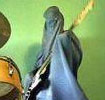 A bit of a blast from the recent past via Music For Maniacs: It’s the debut single from The Burka Band, a group of young women from Kabul who came together during a series of musical workshops conducted in that city by the German record label ata tak back in late 2002. In keeping with their name, they perform in burkas, and write songs about… burkas. In this one, which was a hit in Germany in 2003, a drolly comic rap about this formerly mandatory item of female attire (… my mother wears a burka… my father does it too… I have to wear a burka… the burka it is blue...) is intoned in nursery-rhyme style over stout, echoing drums and chirping, squelching guitar and synth. Very cute, very funny, and remixed by Barbara Morgenstern on the B-side.
A bit of a blast from the recent past via Music For Maniacs: It’s the debut single from The Burka Band, a group of young women from Kabul who came together during a series of musical workshops conducted in that city by the German record label ata tak back in late 2002. In keeping with their name, they perform in burkas, and write songs about… burkas. In this one, which was a hit in Germany in 2003, a drolly comic rap about this formerly mandatory item of female attire (… my mother wears a burka… my father does it too… I have to wear a burka… the burka it is blue...) is intoned in nursery-rhyme style over stout, echoing drums and chirping, squelching guitar and synth. Very cute, very funny, and remixed by Barbara Morgenstern on the B-side.
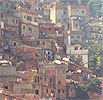 During a trip to Brazil in late 2003, Da Mystik Homeboy (that’s his nom de blog) became switched on to the sounds of funky do morro, a cranking fusion of Miami bass, hip hop and dancehall which emanates from the favelas (shantytowns) on the fringes of Sao Paolo and Rio De Janeiro. Since then he has been compiling an online archive of this music; most of it recorded in local garages by unknown (to an international audience) performers and purchased from street vendors. Now, thanks to the release of compilations of the do morro sound and the rapidly rising star of controversial rapper MIA and her funky do morro obsessed partner, Diplo, Homeboy’s musical passion has become one of the hottest things on the block. Go check it out and thrill to the sounds of next week’s global music superstars.
During a trip to Brazil in late 2003, Da Mystik Homeboy (that’s his nom de blog) became switched on to the sounds of funky do morro, a cranking fusion of Miami bass, hip hop and dancehall which emanates from the favelas (shantytowns) on the fringes of Sao Paolo and Rio De Janeiro. Since then he has been compiling an online archive of this music; most of it recorded in local garages by unknown (to an international audience) performers and purchased from street vendors. Now, thanks to the release of compilations of the do morro sound and the rapidly rising star of controversial rapper MIA and her funky do morro obsessed partner, Diplo, Homeboy’s musical passion has become one of the hottest things on the block. Go check it out and thrill to the sounds of next week’s global music superstars.
 From the excellent Sublime Frequencies label, comes this very different glimpse into Tibetan music; one that eschews the familiar monastic sounds of singing bowls and deep-throated chants, and ventures (as per the title) on to the streets of the Tibetan capital, Lhasa, where itinerant musicians from the countryside perform for the meager sum of one kuai per song (roughly equivalent to 10 cents). Unlike the stately music of the temples, this is much rawer fare, rooted in wailed vocals and roughly hewn melodies played on either the erhu or san xian.
From the excellent Sublime Frequencies label, comes this very different glimpse into Tibetan music; one that eschews the familiar monastic sounds of singing bowls and deep-throated chants, and ventures (as per the title) on to the streets of the Tibetan capital, Lhasa, where itinerant musicians from the countryside perform for the meager sum of one kuai per song (roughly equivalent to 10 cents). Unlike the stately music of the temples, this is much rawer fare, rooted in wailed vocals and roughly hewn melodies played on either the erhu or san xian.
The recordings on this album were made in 2003 by Zhang Jian of the Beijing music/art collective, fm3, who typically hired the street musicians for 50 kuai a session (plus free food and beer), set them up in a quiet park, then let them work through their repertoire. In the process, he managed to capture some pretty memorable performances, like this father and son duo. The parental half of the group sings and saws away on an erhu, while his son bellows all over the melody like a mad thing. Priceless stuff.
As always, the album can be purchased through either the Sublime Frequences site, or from Aquarius Records.
 Last weekend, I was in Melbourne visiting old friends I haven’t seen in yonks, and making my obligatory pilgrimage to one of the best record stores on this island continent, Synaesthesia Records. Unfortunately, I wasn’t able to seriously splurge, but I did pick up this intriguing piece of previously overlooked (except in some psych-geek quarters) album of early 70’s Israeli psychedelic rock.
Last weekend, I was in Melbourne visiting old friends I haven’t seen in yonks, and making my obligatory pilgrimage to one of the best record stores on this island continent, Synaesthesia Records. Unfortunately, I wasn’t able to seriously splurge, but I did pick up this intriguing piece of previously overlooked (except in some psych-geek quarters) album of early 70’s Israeli psychedelic rock.
Up until the late 60’s, domestic Israeli rock was virtually nonexistent; stymied by requirements that popular music was only valid if it “strengthen[ed] the nation’s spirit”. These strictures broke down as the decade ended. In 1969, the first Israeli rock album was recorded and, a year after this, Danny Ben-Israel – who had previously produced Hebrew versions of “The King and I” and “The Sound of Music” – recorded “3 ¼ Bullshit”, a collection of psych-rock driven tracks that occasionally devolved into a chaotic mess of noisy electronics, scratchy acid guitars, and chiming xylophones.
In the context of Israeli music at the time, it was a pretty radical departure from what had gone before. To give you a taste of it, here’s the first (and most chaotic) track, A Different Song. The album can be bought online from Mio Records.
 While he was meant to be studying for his final exams, Berkeley student David Byok found a truly splendid way to distract himself. He compiled a mix CD designed “to introduce dubious Westerners to Bollywood”. This was obviously not enough of a distraction, so he then went one step further and created a Bollywood music primer website, complete with mp3s from his mix CD (which includes the track which Thora Birch boogies on down to at the start of Ghost World), articles about the Indian film industry and Hindi language, and even a list of the most frequently sung words in Bollywood songs (with their English translations).
While he was meant to be studying for his final exams, Berkeley student David Byok found a truly splendid way to distract himself. He compiled a mix CD designed “to introduce dubious Westerners to Bollywood”. This was obviously not enough of a distraction, so he then went one step further and created a Bollywood music primer website, complete with mp3s from his mix CD (which includes the track which Thora Birch boogies on down to at the start of Ghost World), articles about the Indian film industry and Hindi language, and even a list of the most frequently sung words in Bollywood songs (with their English translations).
As far as elaborate study avoidance schemes go, this is one of the most commendable ones ever. Well done, David. You deserve course credits for this, even if it has no relation at all to what you’re studying. (via Boing Boing)
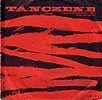 From PCL Link Dump comes this link to a compilation of instrumental music from Hungary which was recorded during the late 50’s and early 60’s. For the most part, its flighty fare that might be classified as exotica, and perfect for your Southern Hemisphere summer cocktail party, but what’s interesting (and very poignant) here is the context. As they say on the site: “You can hear the longing, the sadness, the happiness of an oppressed but very living city, reluctantly going to party after the tragedy of the 1956 revolution (historical note: drowned in blood by the Russian army). Sometimes they're groovy, sometimes they're funny (sometimes unintentionally so), sometimes they're based on outright misunderstanding of third-hand international musical forms. And they all helped the listener to believe that he/she is somewhere else.”
From PCL Link Dump comes this link to a compilation of instrumental music from Hungary which was recorded during the late 50’s and early 60’s. For the most part, its flighty fare that might be classified as exotica, and perfect for your Southern Hemisphere summer cocktail party, but what’s interesting (and very poignant) here is the context. As they say on the site: “You can hear the longing, the sadness, the happiness of an oppressed but very living city, reluctantly going to party after the tragedy of the 1956 revolution (historical note: drowned in blood by the Russian army). Sometimes they're groovy, sometimes they're funny (sometimes unintentionally so), sometimes they're based on outright misunderstanding of third-hand international musical forms. And they all helped the listener to believe that he/she is somewhere else.”
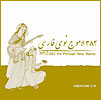 This vinyl only album from exotic punk specialists, Tiananmen 89, is easily one of the most significant releases of 2004. How so? Because, it is the first underground rock compilation to come out of the Islamic Republic of Iran.
This vinyl only album from exotic punk specialists, Tiananmen 89, is easily one of the most significant releases of 2004. How so? Because, it is the first underground rock compilation to come out of the Islamic Republic of Iran.
As you might be able to guess, genres as musically aggressive and obviously Western influenced as hard rock and punk don’t have a terribly long history in Iran. Punks have been around since at least the early 1990’s but, back then, the scene amounted to little more than clandestine tape-swapping. (Apparently, you couldn’t even buy an electric guitar.) With the election of Mohammad Khatami as president in 1997 and the subsequent liberalisation of Iranian society, the rock scene has blossomed and a diverse range of styles are now being embraced by young Iranian rockers. On 1382, you can find snotty English-lyric-barking punks Fat Rats, electro with death metal vocals from Dark Earth, the rousing pop metal of Alookal, and this strange piece of prog rock by Oolanbator entitled “Fire in The Dead of Night”. It starts out conventionally enough with a halting piano and blues guitar jam followed by a propulsive organ workout, but then the wailing banshees start to take over…
The album can be purchased through Darbouka Records, along with the rest of the Tiananmen 89 catalogue which includes punk/rock releases from Madagascar, Kyrgystan, Myanmar, Nepal, Paraguay, Malta, Moldova, Kosovo, Indonesia, Albania, Cuba and Romania... just to name a few.
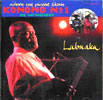 Konono No 1 are a band from Kinshasa who play a traditional form of Angolan/Congolese trance music based around the sound of the likembe (a type of thumb piano). In their case, though, this sound is backed by pots-n-pans percussion, amped up with home-made mics built from magnets salvaged from car parts, and finally sent blaring through a home-brew PA based around megaphones. What emerges from all of this is a glorious, super-saturated racket of galloping rhythms, bellowed vocals and angular metal-guitar-like likembe lines.
Konono No 1 are a band from Kinshasa who play a traditional form of Angolan/Congolese trance music based around the sound of the likembe (a type of thumb piano). In their case, though, this sound is backed by pots-n-pans percussion, amped up with home-made mics built from magnets salvaged from car parts, and finally sent blaring through a home-brew PA based around megaphones. What emerges from all of this is a glorious, super-saturated racket of galloping rhythms, bellowed vocals and angular metal-guitar-like likembe lines.
Until recently, the most readily available recordings of Konono No 1's music were a Quicktime video of a live performance and a rather tepid demo mp3 on the Crammed Discs website. (In addition to this, there were two songs on the 1985 Musiques Urbaines à Kinshasa compilation on Ocora.) Now, however, comes news that not one, but two, live Konono albums have been released. One was recorded in Kinshasa by Crammed and is being used to kick off its Congotronics series devoted to "tradi-modern" groups from Kinshasa, the other comes from a gig they did in Holland in Feb 2003. The latter recording is available through Subterranean Distribution, who have kindly posted an mp3 of one of the tracks, Ditshe Tshiekutala.
 Once again, we’re back in a region whose pop music history holds an endless fascination for me – South East Asia. This time, the stopover comes courtesy of Subliminal Sounds, a Swedish label dedicated to 60’s obscurities, who have just released a compilation of Thai music from that period. Unlike the restless re-interpreters of acid-rock in neighbouring Cambodia, the Thai acts on this CD mostly deliver fairly straightforward (but still quite rocking) renditions of Western beat and surf music. There are, however, a number of notable exceptions; one of these is Johnny’s Guitar, who crank out blaring surf-guitar and organ drenched numbers underscored with racing traditional percussion. Probably the best example of this is their first track on the compilation, Kratae. (Apparently, its a reference to a local variety of rat with a long tail.) In a similar vein, though infinitely more kitschy, is this twitchy Thai-ified version of the James Bond theme by The Son of P.M. The album that they both come from can be purchased from Other Music.
Once again, we’re back in a region whose pop music history holds an endless fascination for me – South East Asia. This time, the stopover comes courtesy of Subliminal Sounds, a Swedish label dedicated to 60’s obscurities, who have just released a compilation of Thai music from that period. Unlike the restless re-interpreters of acid-rock in neighbouring Cambodia, the Thai acts on this CD mostly deliver fairly straightforward (but still quite rocking) renditions of Western beat and surf music. There are, however, a number of notable exceptions; one of these is Johnny’s Guitar, who crank out blaring surf-guitar and organ drenched numbers underscored with racing traditional percussion. Probably the best example of this is their first track on the compilation, Kratae. (Apparently, its a reference to a local variety of rat with a long tail.) In a similar vein, though infinitely more kitschy, is this twitchy Thai-ified version of the James Bond theme by The Son of P.M. The album that they both come from can be purchased from Other Music.
 Chamame is a folk music from the Misiones province in north-eastern Argentina, that mixes up influences from the native Guarani, Afro-Spanish creoles, and East European immigrants, in a lively brew that is characterised by toe-tapping 6/8 rhythms and skipping lines of staccato accordion chords. The current world music poster boy for chamame is Chango Spasiuk, a ridiculously talented accordion virtuoso who has turned this once-derided music from the sticks into a respectable concert hall filler. (He’s even given it a measure of avant-cred, thanks to his work with the likes of John Zorn.) All the while though, he’s never let anyone lose sight of this music’s rural roots. On
Chamame is a folk music from the Misiones province in north-eastern Argentina, that mixes up influences from the native Guarani, Afro-Spanish creoles, and East European immigrants, in a lively brew that is characterised by toe-tapping 6/8 rhythms and skipping lines of staccato accordion chords. The current world music poster boy for chamame is Chango Spasiuk, a ridiculously talented accordion virtuoso who has turned this once-derided music from the sticks into a respectable concert hall filler. (He’s even given it a measure of avant-cred, thanks to his work with the likes of John Zorn.) All the while though, he’s never let anyone lose sight of this music’s rural roots. On this track, for instance, the music is introduced by a chorus of farm animals. The track’s called General Virasoro, and comes from The Charm of Chamame, a 2003 release that compiles the best material from his previous three albums. The album can be purchased through Amazon. (More samples from the album are available at this site.)
(Many thanks to Perfect Sound Forever for putting me on to this musical delight.)
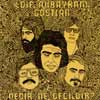 Nedir Ne Degildir? by Edip Akbayram & Dostlar is a fine new addition to the steady stream of 60/70’s Turkish rock reissues that have appeared in the past couple of years. On previous releases, the big Western influence that appears in the music of that period is psychedelic rock. (60’s psych rock, indeed, continued to hold sway in Turkey long after it had faded in the West.) In this latest one, which originally came out in 1975, elements of funk have started creeping into the mix (along with fizzing 70’s synth and the occasional tape speed manipulation.) The bods at Aquarius Records have likened the results to a score for some lost 70’s Turkish car-chase film… And that certainly sums up this track, Arabam Kaldi Yolda, pretty well. As always, the album can purchased through the Aquarius Records site.
Nedir Ne Degildir? by Edip Akbayram & Dostlar is a fine new addition to the steady stream of 60/70’s Turkish rock reissues that have appeared in the past couple of years. On previous releases, the big Western influence that appears in the music of that period is psychedelic rock. (60’s psych rock, indeed, continued to hold sway in Turkey long after it had faded in the West.) In this latest one, which originally came out in 1975, elements of funk have started creeping into the mix (along with fizzing 70’s synth and the occasional tape speed manipulation.) The bods at Aquarius Records have likened the results to a score for some lost 70’s Turkish car-chase film… And that certainly sums up this track, Arabam Kaldi Yolda, pretty well. As always, the album can purchased through the Aquarius Records site.
 For our multicultural TV channel, SBS, the Eurovision Song Contest is a serious ratings cow (500,000+ viewers, which is a big deal for a non-commercial station in this market.). As a result, its not only broadcast live; its preceded by a week off lead-up specials. (And its kiddie version, Junior Eurovision, is also televised.) So, with such a captive market, it would be nice if next year they could cast the net a bit wider, and expose us to some of the other multi-national pop “talent” quests that are out there… Like this one – Azia Dauysy (Voice of Asia), an international festival of song that’s held annually in Almaty, Kazakhstan.
For our multicultural TV channel, SBS, the Eurovision Song Contest is a serious ratings cow (500,000+ viewers, which is a big deal for a non-commercial station in this market.). As a result, its not only broadcast live; its preceded by a week off lead-up specials. (And its kiddie version, Junior Eurovision, is also televised.) So, with such a captive market, it would be nice if next year they could cast the net a bit wider, and expose us to some of the other multi-national pop “talent” quests that are out there… Like this one – Azia Dauysy (Voice of Asia), an international festival of song that’s held annually in Almaty, Kazakhstan.
If the website’s anything to go by, it immediately satisfies all the globo-trash-hound prerequisites. It’s got glitzy sets with blacklights and overactive smoke machines; gaudy costumes; and slick schlock pop… And, it also has a much broader catchment area than its more vaunted Eurocentric cousin – bringing in contestants from as far afield as the Czech Republic in the west, and the Phillipines in the east. As a result, you get a much wider variety of takes on the whole saccharine pop music ideal than you do in Eurovision… Like Georgia’s party-band answer to the Corrs, The Rondo Band; the Bollywood-meets-Urban-R&B stylings of Sri Lankan Nadine; the hilariously bad “sexy” balladry of the Czech Republic’s Tom Malar; and the Malaysian entrant, Waheeda, whose sinuous Middle-East-inflected singing is accompanied by sub-vocalised rapping.
Of course, all of the above is fairly disposable, and so far, the competition hasn’t produced anything as world-conquering as Abba, but it has thrown up one singer who has gone on to have a seriously credible career on the ethereal world music diva circuit – the Uzbek songstress, Yulduz Usmanova.
(To give you an idea of what she sounds like... Here’s a superficially silly track about illegal immigration (with darker undertones) called Kiss Me from her most recent album, Bilmadim, which can be purchased from 30 Hz Records... There are other streamed Yulduz tracks on this site.)
 After getting your freak on to all the chutney and Michigan white-boy booty-rap in the previous two posts, you're probably ready for a change of pace, so let's go back to the Southern Carribean (kinda sorta as this actually comes from the plains of northern South America) for some Venezuelan harp music. On his website at the University of California, ethnomusicologist Robert Garfias has posted this gorgeous album of llanera (traditional harp-based Venezuelan music) which was recorded by the Astor Piazzolla of the form, Juan Vicente Torrealba. Its all very lovely and brings to mind images of cascading streams and waterfall spray dripping from rock-bound ferns... Download and wallow.
After getting your freak on to all the chutney and Michigan white-boy booty-rap in the previous two posts, you're probably ready for a change of pace, so let's go back to the Southern Carribean (kinda sorta as this actually comes from the plains of northern South America) for some Venezuelan harp music. On his website at the University of California, ethnomusicologist Robert Garfias has posted this gorgeous album of llanera (traditional harp-based Venezuelan music) which was recorded by the Astor Piazzolla of the form, Juan Vicente Torrealba. Its all very lovely and brings to mind images of cascading streams and waterfall spray dripping from rock-bound ferns... Download and wallow.
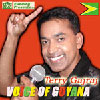 Even if you only have a passing interesting in world music then you're probably readily familiar with Northern Caribbean musical styles like reggae, ska, mambo and rumba... But what about the many hybrids from the south? From places like Trindad and Tobago, and Guyana? If you thought it was all just steel drumming, then get ready for one of the most insane cross-cultural styles ever - chutney music...
Even if you only have a passing interesting in world music then you're probably readily familiar with Northern Caribbean musical styles like reggae, ska, mambo and rumba... But what about the many hybrids from the south? From places like Trindad and Tobago, and Guyana? If you thought it was all just steel drumming, then get ready for one of the most insane cross-cultural styles ever - chutney music...
When slavery was outlawed in the Caribbean, the British planation owners became increasingly reliant on indentured Indian workers. Those workers who came and settled in their new masters' domains brought their music with them and, over time, it became fused with styles developed by African slaves. The result was chutney... which, in recent times, has evolved to become a Hi-NRG amalgam of Bollywood, calypso and dancehall reggae (with elements of US R&B thrown in for good measure).
It has to be heard to be believed, and one of its most prominent exponents is the "Voice of Guyana", Terry Gajraj, who has a site which includes such chutney-esque numbers as Roll Yuh Belly and Yo Mista DJ. (via Oddio Overplay)
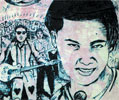 Another day, another fantastic Sublime Frequencies release... This time its a compilation of Cambodian pop/rock recorded between the 60's and 90's. And like that other great album in the genre, Cambodian Rocks (see this earlier post), its all sourced from "found" audio cassettes. This time, though, the cassettes come not from Cambodia, but from the Asian branch of the Oakland, California public library. As with the earlier classic, this album contains everything that makes "old school" Khmer pop such a pleasure - driving acid-tinged guitars, sinuous 60's organs, lilting Bollywoodesque chanteuses, and suave crooners... But, in addition to that, we get to hear how elements like ska horn sections and cheesy 80's synths have seeped into post-Khmer-Rouge music. (There's even a stomping glam-rock number by an unknown act. Its one of the highlights of the album, so I'm posting it as the mp3 you can download.)
Another day, another fantastic Sublime Frequencies release... This time its a compilation of Cambodian pop/rock recorded between the 60's and 90's. And like that other great album in the genre, Cambodian Rocks (see this earlier post), its all sourced from "found" audio cassettes. This time, though, the cassettes come not from Cambodia, but from the Asian branch of the Oakland, California public library. As with the earlier classic, this album contains everything that makes "old school" Khmer pop such a pleasure - driving acid-tinged guitars, sinuous 60's organs, lilting Bollywoodesque chanteuses, and suave crooners... But, in addition to that, we get to hear how elements like ska horn sections and cheesy 80's synths have seeped into post-Khmer-Rouge music. (There's even a stomping glam-rock number by an unknown act. Its one of the highlights of the album, so I'm posting it as the mp3 you can download.)
If you've never heard any Cambodian pop before then this is a good starting point, and you can purchase it from Aquarius Records. If you want to go further, you MUST GET Cambodian Rocks, and check out the wide range of compilations available through specialist online label, Khmer Rocks.
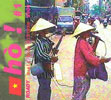 Rummage's love affair with South East Asian pop music continues with this awesome collection of field recordings of street musicians in Ho Chi Minh City, which was released a couple of years ago on Trikont. The recordings were made in 1997 by Nuoc Nam Dirndl, a group of bored Austrian architects whose love of Vietnamese fish sauce inspired them to embark on a guerilla "cultural exchange" programme. The music ranges from schmatzy pop; to bellowed Viet-blues song performed by buskers who carry defects resulting from Agent Orange; to raucous, percussion-heavy funeral bands who sound like "some New-Orleans-Trash-Punk-Free Jazz"; to Shadows and John Lee Hooker-style tracks played on a traditional one-stringed instrument called a Dan Bhu which produces a gloriously other-worldy, theremin-like tremelo. (As diverse as it is, the one thing that all this music has in common is that its dismissed by Vietnamese yuppies as "shit music"... So you know it must be worth a listen!)
Rummage's love affair with South East Asian pop music continues with this awesome collection of field recordings of street musicians in Ho Chi Minh City, which was released a couple of years ago on Trikont. The recordings were made in 1997 by Nuoc Nam Dirndl, a group of bored Austrian architects whose love of Vietnamese fish sauce inspired them to embark on a guerilla "cultural exchange" programme. The music ranges from schmatzy pop; to bellowed Viet-blues song performed by buskers who carry defects resulting from Agent Orange; to raucous, percussion-heavy funeral bands who sound like "some New-Orleans-Trash-Punk-Free Jazz"; to Shadows and John Lee Hooker-style tracks played on a traditional one-stringed instrument called a Dan Bhu which produces a gloriously other-worldy, theremin-like tremelo. (As diverse as it is, the one thing that all this music has in common is that its dismissed by Vietnamese yuppies as "shit music"... So you know it must be worth a listen!)
The album can be heard in its entirety on the Nuoc Nam Dirndl website (the audio though is in low bit rate Real Audio streams) and can be purchased through Fuse Music Group.
(FOOTNOTE: The yuppies prefer Sting...)
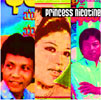 Another couple of releases from the very wonderful Sublime Frequencies label… I Remember Syria is a double CD of field recordings from a country that only ever gets international exposure when its being tarred as a terrorist haven by Western media. The recordings were made by Mark Gergis (of Monopause and Neung Phak fame) during visits to Syria in 1998 and 2000. Unlike other releases on the label, it incorporates interviews with locals, including a mujahadeen, a man who riffs on fictitious meetings with Bill Clinton, and
Another couple of releases from the very wonderful Sublime Frequencies label… I Remember Syria is a double CD of field recordings from a country that only ever gets international exposure when its being tarred as a terrorist haven by Western media. The recordings were made by Mark Gergis (of Monopause and Neung Phak fame) during visits to Syria in 1998 and 2000. Unlike other releases on the label, it incorporates interviews with locals, including a mujahadeen, a man who riffs on fictitious meetings with Bill Clinton, and a homosexual from the port city of Aleppo.
Princess Nicotine is one of the first wide-release CDs of pop music from Burma. And it’s a true revelation! Burmese pop is one of the most unrestrained, anarchic mélanges of musical influences ever conceived… Songs open with manic fanfares and juxtapose sultry chanteuses with distorted male vocals; mellow ballads are underscored with ear-piercing instrumental arrangements; and the music echoes everything from Bollywood and free-jazz to Appalachian folk and Edith Piaf… Want a sample of these hyperactive aural confections? Check out My Love’s Darling Arrow by Ni Ni Win Shwe.
 Back in 1983, while holidaying in a Morocco, American musician Alan Bishop found himself captivated by the local music pouring out of his transistor radio. From this scratchy little receiver, he heard not only traditional fare but wildly imaginative hybrids that blended Arabic music with Euro-pop, be-bop and heavy rock. He avidly recorded everything he heard and edited into a series of radio collages that mixed the music with sporadic blasts of news and advertising… It was an activity that he would repeat during his later travels elsewhere in the Middle East and in Indonesia.
Back in 1983, while holidaying in a Morocco, American musician Alan Bishop found himself captivated by the local music pouring out of his transistor radio. From this scratchy little receiver, he heard not only traditional fare but wildly imaginative hybrids that blended Arabic music with Euro-pop, be-bop and heavy rock. He avidly recorded everything he heard and edited into a series of radio collages that mixed the music with sporadic blasts of news and advertising… It was an activity that he would repeat during his later travels elsewhere in the Middle East and in Indonesia.
Originally, of course, they were designed to be little more than souvenirs of his travels (although they probably had a big influence on the faux-ethnic outsider sound of his band Sun City Girls). Recently, however, they have been re-mastered and released on Bishop's world music label, Sublime Frequencies.
So far, his private collection has been the source of three radio collage CDs, Radio Java, Radio Morocco, and Radio Palestine… The results give you a sense of what its like to actually be in a completely foreign country; bombarded by sounds that flood the senses and – even though they might resemble sounds from home – still seem incomprehensibly alien…
The first of these releases, Radio Java, was originally featured on the show back in February. To give you a taste, here’s the remix we played. And from Radio Morocco, here is a piece from track 5 on the CD which fuses classical Arabic music with the sort of 60’s beat music beloved by the Turks (featured on the show on June 26th)
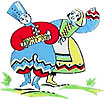 Oddio Overplay is another one of those high-minded net labels who release entire albums of mp3s on-line for free. In addition to work by individual artists, they have a series of compilations that include such diverse fare as 30’s jazz and blues, traditional music from Asia, and Red Army Favorites; a collection of songs from the former Soviet Union. This last compilation includes old Soviet republic anthems, traditional balalaika bands, cheesy pop, emo rock, dub, electronica, and something, which if it had a name, might be called Slavic folk-punk-ska. Here are a few examples…
Oddio Overplay is another one of those high-minded net labels who release entire albums of mp3s on-line for free. In addition to work by individual artists, they have a series of compilations that include such diverse fare as 30’s jazz and blues, traditional music from Asia, and Red Army Favorites; a collection of songs from the former Soviet Union. This last compilation includes old Soviet republic anthems, traditional balalaika bands, cheesy pop, emo rock, dub, electronica, and something, which if it had a name, might be called Slavic folk-punk-ska. Here are a few examples…
Iva Nova - Aunt Marussya (Tyotya Marussya) - This track is from St Petersburg all-female band, Iva Nova. (Their claim to fame?... Their drummer was once invited to play with Kraut-rock legends Faust.) It starts off sounding like a plaintive ode to the Motherland but quickly transforms into an accordion and surf-guitar-fuelled stomp.
Leningrad - Crucified (Raspezdyai) - Leningrad write songs about “the important things in life – vodka and women”, occasionally perform nude, frequently get banned from performing mid-tour, and are one of the most popular underground bands in Russia.
Vopli Vidopliassova - Pidmanula - This is the most traditional sounding of the three and comes complete with keening female vocals typical of Ukrainian folk music. Once again, though, its given the full ska-punk treatment…
(And if you want to hear more of this, you might want to check out Russendisko, a compilation of contemporary Russian music on the Trikont label)
 The Sydney leg of REAL:Life, an annual travelling documentary festival, kicked off at the Chauvel last night. Skimming through the programme, I noticed two music-related docos that should definitely be worth checking out - Channels of Rage, which is about the vexed relationship between pro-Zionist Israeli rapper, Subliminal, and his Palestinian protege, MC Tamer; and Screaming Men, which is about Mieskuoro Huutajat, The Finnish Shouting Men's Choir.
The Sydney leg of REAL:Life, an annual travelling documentary festival, kicked off at the Chauvel last night. Skimming through the programme, I noticed two music-related docos that should definitely be worth checking out - Channels of Rage, which is about the vexed relationship between pro-Zionist Israeli rapper, Subliminal, and his Palestinian protege, MC Tamer; and Screaming Men, which is about Mieskuoro Huutajat, The Finnish Shouting Men's Choir.
Hailing from Oulu, a provincial town in Northern Finland (which is also home to the World Air Guitar Championship), Huutajat Mieskuoro was formed in 1987 by a couple of guys in the local punk scene who decided it might be amusing to get 20 men in black suits and rubber ties, and have them shout over the top of popular Finnish songs. (Why shout? Well, basically because Finns have a tradition for being quiet...)
From these humble, tongue-in-cheek beginnings, Huutajat have gone on to become the toast of the European music festival circuit, and have even scored a Top Ten hit in their homeland. Recently, it was reported that they planned to perform on the frozen Baltic Sea for the crew of a stranded ice-breaker.
If you can't make it to the film (which is screening on Saturday) and you'd like to hear a sample of Huutajat in all their bellowing glory, there are a couple of mp3s from their 10th Anniversary Concert CD on their website. The CD itself can be buy through Finnish label, Bad Vugum. (For more background on the group and its eccentric hometown, check out this article from The Age.)
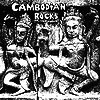 Back in the mid 90's, while en route to Angkor Wat, American tourist Paul Wheeler became captivated by a tape of 60's Cambodian rock which was played repeatedly by his driver. The music owed a lot to the US acid-rock and psychedelia of the period, BUT it was not just some listless copy of the Great Cultural Exporter's tunes... This was a vigorous, locally-inflected reinterpretation of the US psych sound by top-notch artists... And it rocked!
Back in the mid 90's, while en route to Angkor Wat, American tourist Paul Wheeler became captivated by a tape of 60's Cambodian rock which was played repeatedly by his driver. The music owed a lot to the US acid-rock and psychedelia of the period, BUT it was not just some listless copy of the Great Cultural Exporter's tunes... This was a vigorous, locally-inflected reinterpretation of the US psych sound by top-notch artists... And it rocked!
Wheeler never found out the names of any of the songs or artists, but by the time he got back to Phnom Penh, he was able to hum the tunes well enough to score copies from local cassette peddlars. When he got back to the States, he released the pick of them on a compilation called Cambodian Rocks.
In time, this CD would spawn a modest US-based rebirth of this music which had been cut off in its prime when the genocidal Khmer Rouge came to power in 1975. Now, some 8 years after its release, there is a whole series of Cambodian Rocks compilations available from the Khmer Rocks website (and these actually have track and artist info). In California, there are even two highly respected bands, Dengue Fever and Neung Phak, who play Cambodian style rock (Neung Phak also include songs from Laos, Vietnam, Thailand and Taiwan).
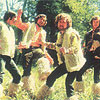 At the other end of the Asian continent is another country whose psych-rock history has recently become an object of Western hipster fascination - Turkey...
At the other end of the Asian continent is another country whose psych-rock history has recently become an object of Western hipster fascination - Turkey...
And, apparently, it is a long and rich history indeed. Where Western psychedelic music pretty much petered out at the beginning of the 70's, its Turkish cousin remained a big part of the local scene for much of that decade. This was probably helped in part by the fact that many of the artists simply used US acid-rock as a influence, and kept their roots firmly in Anatolian folk traditions. This is reflected both in the songwriting and instrumentation, which often relied as much on the oud, saz and darbuka as it did on your standard fuzzed-out guitar.
For a good introduction to this music, check out some of the articles on this Turkish prog site and track down the compilation CDs, Turkish Delights and Hava Narghile. If this whets your appetite and you want more, then have a rummage through the excellent collection of re-issues in the Middle Eastern section of Aquarius Records. (As always, there are streamed audio "highlights" from most of the albums listed.)